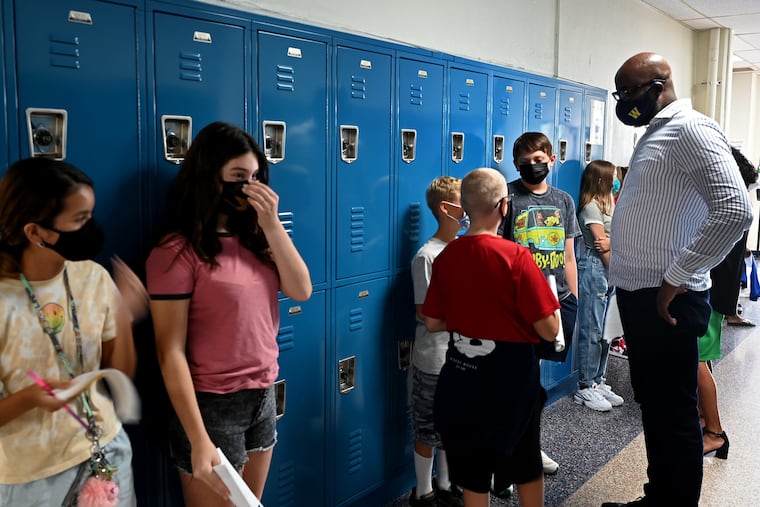A N.J. bill is proposing later start times for high schools. Will it make a difference?
If approved, a bill recently introduced in the state Legislature would push back the start time for most high schoolers to no earlier than 8:30 a.m. beginning with the 2023-24 school year.

New Jersey lawmakers have reignited the debate over whether high schools should begin later to allow students more sleep before starting their day.
If approved, a bill recently introduced in the state Legislature would push back the start time for most high schoolers to no earlier than 8:30 a.m. beginning with the 2023-24 school year. The measure does not apply to middle or elementary schools, but those would likely be affected because of buses and after-school activities, officials say.
Delaying what time school starts has been widely debated nationally for years, but experts believe that later start times for high school students could improve academic outcomes because their shifting sleep patterns require later sleep. Philadelphia School District announced last month it is moving its start times to 9 a.m. for most high schools in September.
Haddonfield High School freshman Gala Durkin says she faces a “really big struggle to get out of bed” most days. Her mother drops her off at 7:30, and she finds it hard to pay attention in her first-period global impact class, even though it’s her favorite subject.
“I’m not really focused,” said Durkin, 14. “I find myself dozing off. “
The bill’s sponsors, Assembly Speaker Craig Coughlin (D., Middlesex) and State Sen. Vin Gopal (D., Monmouth), said they were motivated in part because of the impact the pandemic has had on students’ mental health. They believe students who get more sleep will perform better academically. Gov. Phil Murphy has said he is ”open-minded” about the bill, which heads next to a committee for review possibly in May or June.
Currently, most New Jersey high schools begin their day at 7:51, compared with the national average of 8 a.m., according to the National Center for Education Statistics. Elementary and middle schools typically start later.
The New Jersey Education Association hasn’t taken a position on the start-time bill but believes ”any reform that might benefit students is well worth considering and implementing,” said spokesperson Steve Baker.
Baker and others, however, believe the change, if adopted, could affect students who work after school or participate in extracurricular activities. It could also cause transportation and child-care problems for families that depend on older children to take care of their younger siblings. Sporting activities would also have to be pushed back.
Kimberly Dickstein, an English teacher at Haddonfield High School, said educators should take this opportunity to evaluate how the school day is structured. Instead of a typical eight periods, maybe four periods should be implemented, she said.
”We don’t have to do things the way we have always done them,” Dickstein said. “We really should be talking about how academics could be different during the school day.”
» READ MORE: New Jersey’s Teacher of the Year encourages her students at Haddonfield High to ‘learn to live’
In Gloucester County, the Woodbury Public Schools began exploring a later start time at its high school in 2020, but that was halted after the pandemic hit, said Superintendent Andrew Bell. School currently starts at 7:45.
Bell said the district is revisiting the issue and sending a survey to parents to possibly push the start back to 8:30 as early as September. The time would likely be changed for elementary schools, too, he said.
“Some people like it. Some people don’t,” said Bell. “I think it’s a good move.”
Cherry Hill Public Schools also has been considering new start times for several years, said Superintendent Joseph Meloche. Any change would likely include all elementary and middle schools, mainly because of transportation issues, he said. Bus drivers, who transport 8,000 students daily, need at least 30 minutes between routes, he said.
Meloche is in favor of high school students starting later. In the meantime, the district is getting feedback from the community on the possible impact on families and schedules, he said.
”I wholeheartedly agree kids need more sleep,” said Meloche.
Teens especially need additional rest to function well because their sleep patterns shift during puberty, experts say. Most require at least eight hours of sleep, but many don’t get that.
For the 2021-22 school year, the Camden school district changed to tiered scheduling with a 9 a.m. start time at its high schools, partly because of transportation issues and also to accommodate students who escort younger siblings to school.
Even with the later time, Karen Borrelli, a health and physical education teacher at Camden’s Brimm Medical Arts High School, said at least a handful of students arrive late every day for her first-period class. A few latecomers were seen arriving at school Tuesday.
“The later start doesn’t help us at all,” said Borrelli.
The first period is typically toughest for teachers because of chronic tardiness, said Kate Seltzer, a professor in the department of language, literacy, and sociocultural education at Rowan University’s College of Education.
A former English teacher in New York City public schools, Seltzer said her students often trickled in about 30 minutes late. An 8:30 start makes sense, especially for students who commute a distance to school, she said.
“I think it’s certainly worth a try if you can get past the logistics issues,” Seltzer said. “If we had had a later start time, it would have been a more humane morning.”